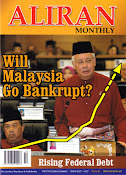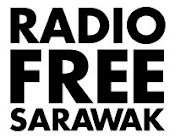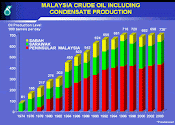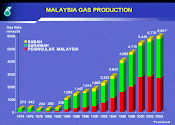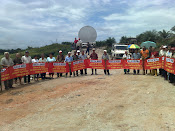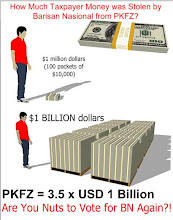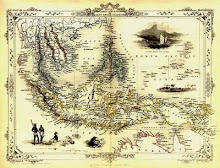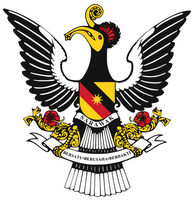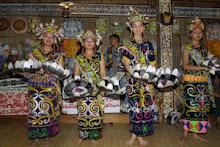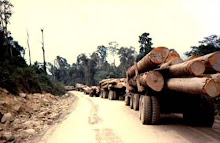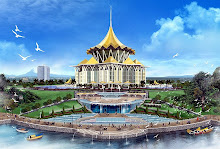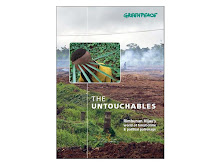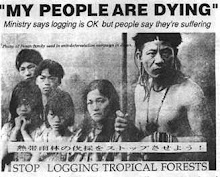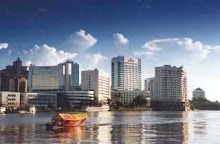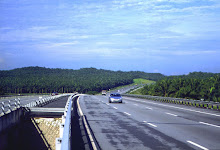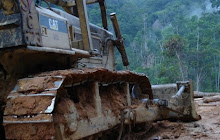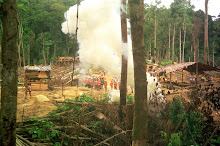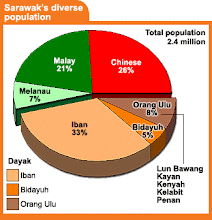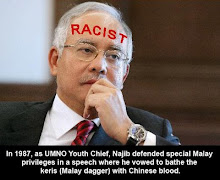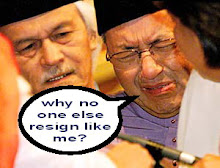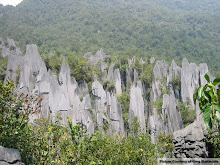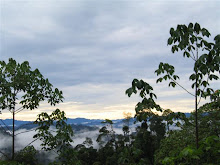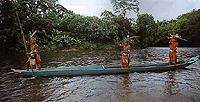THE 22ND JULY 2014 SEVEN POINTS BY PAKATAN RAKYAT (7P).
Comments by Sarawak Headhunter in red:
Point 1
1. In recognition of the spirit of the federal compact signed in 1963 known as the Malaysia Agreement, to:
a.
Recognise – in the Federal Constitution, text books and official discourses – Sabah and Sarawak as special states that are equal partners to the Peninsula of Malaysia within the Federation of Malaysia; and
b.
Recognise three National Days: August 31 as the Merdeka Day for Malaya and Sabah, July 22 as the Independence Day for Sarawak and September 16 as Malaysia Day – with national celebrations for August 31 and September 16.
Point 2
2. In the spirit of true federalism that values unity in diversity while preserving a cohesive nation, to:
a.
Uphold Bahasa Malaysia as the national language unifying all Malaysians regardless of faiths, ethnicity or mother-tongue;
In the true spirit of the Malaysia Agreement, Sarawak and Sabah should revert to English as their official language. If the Malayans know what is good for them they will also do so, but they are not to be compelled in this regard, nor should they compel Sarawak and Sabah, with their minority Malay populations, to adopt the Malay language.
b.
Protect the freedom of expression and information in all languages, as enshrined in the Federal Constitution, including the use of Allah in the Malay and Iban-language Bibles and other publications; and
c.
Establish a television channel for Borneo.
Why only one? Sarawak and Sabah should be able to establish as many television channels as they like.
Point 3
3. In full recognition of the injustice in the marginalization and poverty suffered by Sarawak and Sabah despite their rich resources, as a result of corruption, nepotism and cronyism by both the Federal and State Governments, bring about the following economic reforms and developments when Pakatan Rakyat forms the new federal and state governments:
a. Federal-state sharing of petroleum wealth and power in Petronas, with
i.
a director each from Sarawak, Sabah and all other petroleum-producing states on Petronas’ Board;
ii.
the establishment of state-owned second-tiered Oil and Gas company as Petronas’ partners; and
iii.
20% royalty for those states;
b. The abolition of cabotage policy to eliminate the artificial price disparity that burdens the people of Sarawak and Sabah;
c. The construction of a Pan-Borneo highway of comparable quality to those highways in Peninsular Malaysia.
d. The supply of electricity and tap water to 90% of households in Sarawak and Sabah.
The target should be 100%. No community or household should be left behind.
Point 4
4. To correct and prevent the illegal naturalization and enfranchisement of foreigners and the failure in safeguarding the border of Sabah, establish permanent joint Federal-State Commissions in Sarawak and Sabah answerable to both the Federal Parliament and the respective State Assemblies in order to oversee:
a.
The naturalization of foreigners in Sarawak and Sabah;
b.
The trans-migration of other Malaysians into Sabah and Sarawak; and
c.
Border and coastline security in both states.
Point 5
5. To ensure protection of the native communities and environment:
a.
Establish State Land Commissions in Sarawak and Sabah, with institutionalized representation from the native communities and answerable to the respective State Assemblies, to administer land especially Native Customary Rights (NCR) lands, undertake surveys, investigate and resolve land disputes; and
b.
Establish elected third-tiered governments at city and division level, with the boundaries of rural divisions taking into account socio-cultural boundaries of native communities where possible, to facilitate participatory decision-making and indigenous autonomy.
Point 6
6. Guided by the spirit of the 1963 Malaysia Agreement, support human resource development in Sarawak and Sabah, with no discrimination on the ground of religion, through:
a.
Borneonisation of the state public service in Sarawak and Sabah with transparent and meritocratic recruitment and promotion;
b.
Recruitment of more Borneans into the Administrative and Diplomatic Services and appointment of more Borneans as Ambassadors and High Commissioners; and
c.
Both scholarships for both Bornean students in general and Bornean native students in particular with no discrimination on the ground of ethnicity and religion.
Point 7
7. Establish a Royal Commission of Inquiry to commence a study on the health of federalism in Malaysia within the first year of the new Federal Government and complete it within 3 years, to reform and rejuvenate our federal system before GE15 to better serve the nation and all the states and territories.
Comments by Sarawak Headhunter in red:
Point 1
1. In recognition of the spirit of the federal compact signed in 1963 known as the Malaysia Agreement, to:
a.
Recognise – in the Federal Constitution, text books and official discourses – Sabah and Sarawak as special states that are equal partners to the Peninsula of Malaysia within the Federation of Malaysia; and
To avoid confusion and to assist in national integration instead of alienation (and colonization), Peninsula Malaysia should revert to its old name of Malaya so that "Peninsular Malaysians" (Malayans) stop referring to it as "Malaysia" and don't keep asking Sarawakians and Sabahans who travel to Malaya when they arrived in Malaysia.
b.
Recognise three National Days: August 31 as the Merdeka Day for Malaya and Sabah, July 22 as the Independence Day for Sarawak and September 16 as Malaysia Day – with national celebrations for August 31 and September 16.
Preferably there should only be ONE National Day and that is Malaysia Day, September 16. Celebrating too many "National Days" is divisive. Each Nation (Malaya, Sarawak and Sabah) can celebrate its own Independence Day separately, NOT as a national celebration. As it is now, to call August 31 as "National Day" is highly misleading, since it only applies to the Independence Day of Malaya and Sabah, not Sarawak.
2. In the spirit of true federalism that values unity in diversity while preserving a cohesive nation, to:
a.
Uphold Bahasa Malaysia as the national language unifying all Malaysians regardless of faiths, ethnicity or mother-tongue;
In the true spirit of the Malaysia Agreement, Sarawak and Sabah should revert to English as their official language. If the Malayans know what is good for them they will also do so, but they are not to be compelled in this regard, nor should they compel Sarawak and Sabah, with their minority Malay populations, to adopt the Malay language.
b.
Protect the freedom of expression and information in all languages, as enshrined in the Federal Constitution, including the use of Allah in the Malay and Iban-language Bibles and other publications; and
c.
Establish a television channel for Borneo.
Why only one? Sarawak and Sabah should be able to establish as many television channels as they like.
Point 3
3. In full recognition of the injustice in the marginalization and poverty suffered by Sarawak and Sabah despite their rich resources, as a result of corruption, nepotism and cronyism by both the Federal and State Governments, bring about the following economic reforms and developments when Pakatan Rakyat forms the new federal and state governments:
a. Federal-state sharing of petroleum wealth and power in Petronas, with
i.
a director each from Sarawak, Sabah and all other petroleum-producing states on Petronas’ Board;
What a director each from Sarawak and Sabah and all other petroleum-producing states? Only proportionate representation based on the approximate value of each country or state's production would be fair.
Also a formula should be worked out whereby the shareholding of Petronas should be restructured on the same proportionate basis, with say 20% to the Federal Government and the balance of 80% proportionately between the petroleum-producing countries/states.
Petronas's management structure should also be revamped so that there is a regular rotation of qualified persons for the position of CEO between the petroleum-producing countries/states. Senior management positions should as far as reasonably possible be allocated equitably and take into account merit as well as contribution.
ii.
the establishment of state-owned second-tiered Oil and Gas company as Petronas’ partners; and
iii.
20% royalty for those states;
Not acceptable. Petronas has been in existence and has been in full control of the petroleum resources of the relevant countries/states for 40 years already. 20% is insufficient redress. The formula should be 80:20 not using the value of crude at the well-head as has been practised all this while, but given the full attributed refined value added.
b. The abolition of cabotage policy to eliminate the artificial price disparity that burdens the people of Sarawak and Sabah;
c. The construction of a Pan-Borneo highway of comparable quality to those highways in Peninsular Malaysia.
It should not just be a Pan-Borneo highway, but a whole network of highways linking all major cities and towns in Sarawak and Sabah, all toll-free.
d. The supply of electricity and tap water to 90% of households in Sarawak and Sabah.
The target should be 100%. No community or household should be left behind.
Point 4
4. To correct and prevent the illegal naturalization and enfranchisement of foreigners and the failure in safeguarding the border of Sabah, establish permanent joint Federal-State Commissions in Sarawak and Sabah answerable to both the Federal Parliament and the respective State Assemblies in order to oversee:
a.
The naturalization of foreigners in Sarawak and Sabah;
This process must be made open and transparent with properly defined and informed procedures, so that true local citizens may also voice legitimate objections where deemed necessary.
Reversal of the illegal naturalization and enfranchisement of foreigners must also take place. Since most of them have been a long time in the country, permanent residence may be considered on individual merits but not citizenship or the right to vote.
b.
The trans-migration of other Malaysians into Sabah and Sarawak; and
c.
Border and coastline security in both states.
Point 5
5. To ensure protection of the native communities and environment:
a.
Establish State Land Commissions in Sarawak and Sabah, with institutionalized representation from the native communities and answerable to the respective State Assemblies, to administer land especially Native Customary Rights (NCR) lands, undertake surveys, investigate and resolve land disputes; and
A unit trust scheme along the lines of ASN/ASB with local participation, consent and input should be established to properly develop and unlock the value of un-utilized or under-utilized NCR lands for the benefit of the respective landowners, while at the same time preserving their customary rights.
b.
Establish elected third-tiered governments at city and division level, with the boundaries of rural divisions taking into account socio-cultural boundaries of native communities where possible, to facilitate participatory decision-making and indigenous autonomy.
Point 6
6. Guided by the spirit of the 1963 Malaysia Agreement, support human resource development in Sarawak and Sabah, with no discrimination on the ground of religion, through:
a.
Borneonisation of the state public service in Sarawak and Sabah with transparent and meritocratic recruitment and promotion;
b.
Recruitment of more Borneans into the Administrative and Diplomatic Services and appointment of more Borneans as Ambassadors and High Commissioners; and
c.
Both scholarships for both Bornean students in general and Bornean native students in particular with no discrimination on the ground of ethnicity and religion.
Point 7
7. Establish a Royal Commission of Inquiry to commence a study on the health of federalism in Malaysia within the first year of the new Federal Government and complete it within 3 years, to reform and rejuvenate our federal system before GE15 to better serve the nation and all the states and territories.
With the above caveats, comments and recommendations, I believe a good start can be made at normalising the health of federalism in Malaysia.
Other areas that will need to be seriously looked into are the revamp of the electoral system, giving due weight to Sarawak and Sabah, appointment of Prime Minister on a popular vote basis instead of majority party basis (thereby also giving qualified Sarawakians and Sabahans a chance to lead the nation), financial autonomy and education system.
In the event unfairness, injustice and oppression still persist, Sarawak and Sabah should have at any time the opportunity and right to review the situation by referendum to decide whether to secede or not without any interference from Malaya.
Al Tugauw
Sarawak Headhunter


